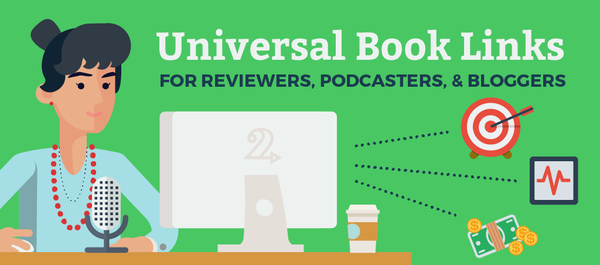Universal Book Links (UBLs) can streamline how you recommend books to readers, whether you’re an author, a blogger, or anyone looking to profit from reviewing and recommending books. This week’s post will give you a few tips for using UBLs to connect readers to books they’ll love.
As an indie author, the odds are that by now you’ve heard of D2D’s Universal Book Links. If not, here’s a brief rundown …
UBLs empower you to:
- Copy and paste a link from any ebook product page to create a link for that book on every digital retailer, all from a single URL
- Customize that URL to make it easier for readers to remember and use
- Track the number of clicks your UBL receives, and what storefronts were visited
- Add affiliate links from Amazon, Barnes & Noble, Apple, Kobo, Google Play, and even Smashwords (yeah, we know, right?)
- Update your UBL with new storefronts any time with a click of the ‘rescan’ button
As an author, that means that wherever your books are sold, you only have to give potential readers a single URL. You can streamline Facebook ads, newsletters, book pages on your site, and even print ads and marketing materials. Very handy.
But it gets better … especially if you are a blogger, podcaster, or anyone recommending books to readers on a regular basis. Because UBLs are not limited to just your books.
Targeting and Tracking
Just as with authors, the trouble is targeting. In the past it’s been easiest to just aim your blog posts or podcast episodes at a single retailer, such as Amazon, and hope that most your readers or listeners prefer shopping there. The danger, of course, is that a large number of them won’t.
iBooks readers, for example, tend to be extremely loyal to Apple. So targeting your book recommendations entirely at Amazon readers may cut you out of a large chunk of your audience. UBLs can level that playing field, however, by allowing you to target every store where a book might be found, all from one link.
The custom URL makes life much easier for podcasters and video bloggers as well. You won’t have to worry about a mouthful of URL—with a random range of alpha and numeric characters that make it completely unmemorable. Custom UBLs let you choose your presentation.
You can even use custom UBLs to help you track where your readers and listeners are coming from.
Just insert a tag in the custom name—maybe the call sign of your podcast (such as “WPC” for the Wordslinger Podcast), or the name of your blog. You should probably keep it short and sweet, so the URL remains memorable.
Use one tag in your podcast mention, and another on your blog, and a different one entirely in your social media posts. From these you’ll know which parts of your platform are getting you the most traffic.
Earn Some Extra Scratch
As mentioned above, UBLs allow you to insert your affiliate codes into the URL.
NOTE: Just to quash any rumors … Draft2Digital takes nothing from your affiliate sales. We’re just the conduit for you to connect readers with books.
Embedded affiliate codes may be one of the coolest features about UBLs. With just one link you gain the ability to make affiliate revenue from book sales regardless of where the book is purchased. You won’t have to settle on just being an Amazon associate, but instead can earn from a growing list of digital retailers. And you won’t have to worry about including your various affiliate codes in a string of new URLs every time you promote a book.
And since you can create a UBL for any ebook, you can earn extra income from books by authors you interview, or just books you’ve read, reviewed, or recommend.
Some uses for this might include:
- Create a “Reading Recommendation” page on your site, with links to books you think are a good fit for your audience
- Send reading lists in newsletters or post on blogs, Medium, or elsewhere
- Link to books written by authors you’ve interviewed
- Link to all the bestsellers of the year in an annual “year in review” post
Or get crazy and come up with something altogether new.
Bend Our Ear
If you do that, by the way, tells us about it! In the comments on this post, by email, or even on our Facebook page, leave us a note about how you’re using UBLs. We’d love to hear it, and anything you come up with could help other authors, bloggers and podcasters.
UBLs are one of our favorite tools here at Draft2Digital, and we’re still coming up with new ways to use them. So watch this spot for what we come up with next!
